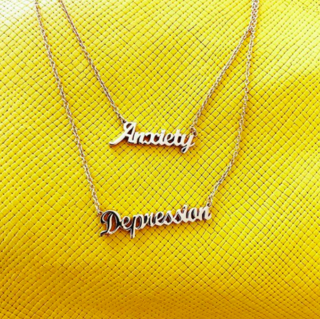Anxiety
Wearing Mental Illness as a Badge of Honor
Is it possible to embrace your mental illness enough to wear its name every day?
Posted May 30, 2018
“Anxiety Necklace Sold Out”
That’s a sentence I never imagined I’d read.
Jen Gotch, founder of online shop ban.do, created two necklaces in collaboration with jewelry company Iconery. One says Anxiety and one says Depression and they’re made in the style of nameplate necklaces.

Gotch created the necklaces because, as she opened up on her Instagram page about her personal experiences with mental illness, she saw the potential to inspire further conversation about mental health.
The necklaces — buying them, wearing them, and talking about them — could help contribute to reducing the stigma connected to mental illness and has already generated money for a charitable organization working on issues related to mental health promotion. (All net proceeds from sales go to Bring Change To Mind.)
Says Gotch on the ban.do site:
“It was something we always expected to be a quick in and out, but hours after the necklaces went live, and subsequently sold out, we realized we had happened upon something that could grow to be much more meaningful to our team, our brand, and our community.”
So, they created more — one that says Bipolar and one that says “7.8,” the just-right “magic number,” on a scale of 1 to 10, symbolizing a good day for Gotch. And they kept producing Anxiety and Depression necklaces so that people who wanted them could get them.
(The necklaces are sold out on The Iconery site, but you can still buy them at ban.do.)
They also created space on the ban.do website to chronicle Letters to Jen, notes from people who have found meaning in the necklaces. Here’s one, edited for brevity:
I’ve sat here with this message open for a solid hour, nervous and anxious to write you. I’m 30 years old and have never once thought that I might have mental health issues, because I mean c’mon everyone has anxiety right?!
That recently changed when I started following you and you became open with talking about it and not being ashamed or trying to hide it. I looked deeper at myself and finally starting noticing all the signs. You would think getting sick every night and each time I get over-anxious would be clear, but apparently not.
Thanks to you, I started therapy about a month ago, and I’ve learned SO MUCH!
But because of you and your openness and bringing up the dialogue, you’ve honestly saved me. And I know you’ll get a million messages, but thank you — it means more than you know. I want to do my part in spreading the message and letting people know IT’S OKAY to talk about.
What’s most striking to me is the contrast between the ban.do brand — peppy, lively, millennial pink, and blow-up swim floaties — and the realities of people who face mental illness. Gotch connects with a generation who is used to Instagramming their lives, filtering out the bad things, and says, “You don’t have to do that.”
She also seems to be saying, by holding the contrast, that you can have a very beautiful life while experiencing mental illness. That both/and seems to be a way of reducing stigma, showing that depression or anxiety don’t always look whatever way we think they look, that successful and fun people can also be people who live with depression and anxiety.
So, is Jen Gotch the most important person on Instagram (as Molly Longest posits on TheLaLa.com)? Since she’s turning the very idea of Instagram upside down — filter, but filter with reality, showcase pain, and don’t fake it — she very well could be.
Here is (some) of what she’s written on Instagram, which I’ve edited and highlighted to focus on how she addresses the “trendiness” of talking openly about mental health and why she designed the necklaces. She’s right: This moment is a moment where more people are more open about everything. And, she’s aware that it isn’t always okay to be open to everyone all the time, that there is often a risk in sharing your story.
i've struggled with mental health issues most of my life and as i gained insight about my own mental health, through decades of therapy, research and medical assistance, i became more and more willing to share my experience. i have talked about many traditionally private subjects on social media for years, long before it was accused of becoming a trend. we have made a business of creating trends, not following them, and mental health has never been a trend for me. i intentionally designed subtle, wearable necklaces that could spark a conversation for those ready to do so, and in order for someone else to actually read what they say, they need to be quite close to you. i figured if they are that close, they are close enough to give you a hug or a kiss or to have you tell them a little bit more about what the necklace means. i know what i am doing is right, important and born from a pure desire to help. from the outside in ban.do might just look like another big, faceless, millennial lifestyle company, but it is founder led and run by real people, by peers, with a lot of heart and we will always aim to be a bright spot in people's lives. we've been tackling sadness and stress through our products, our language and our sense of humor since we started the company and this is just a bigger, bolder step in that direction.
Would you buy one of these necklaces? Would you wear it? Gift it? Would seeing one lead you to start a conversation?
Copyright 2018 Elana Premack Sandler, All Rights Reserved


